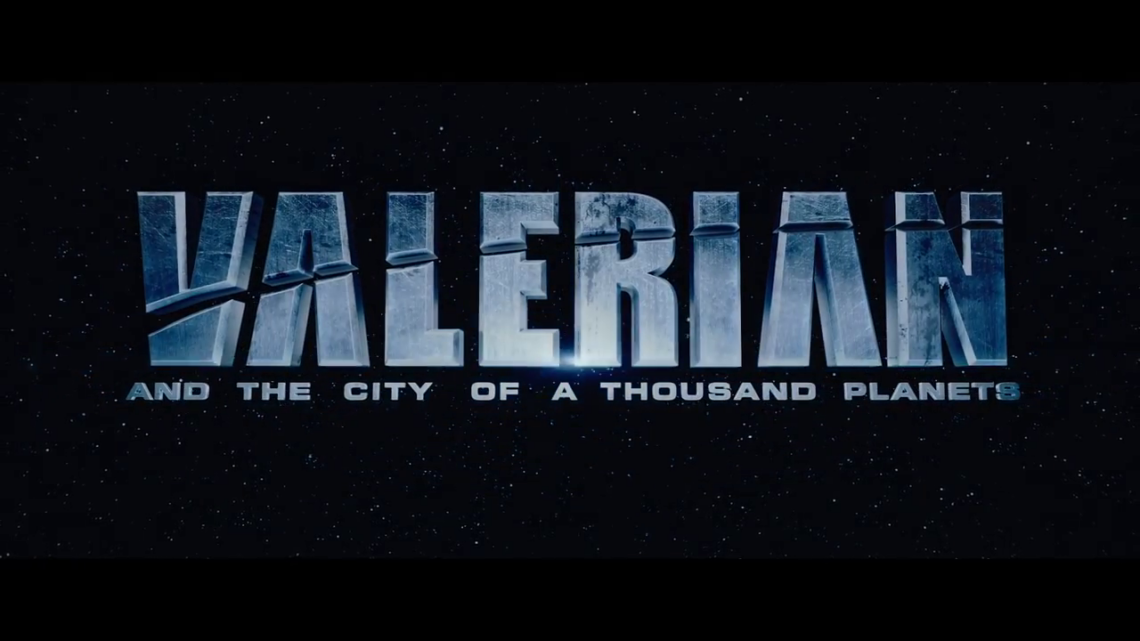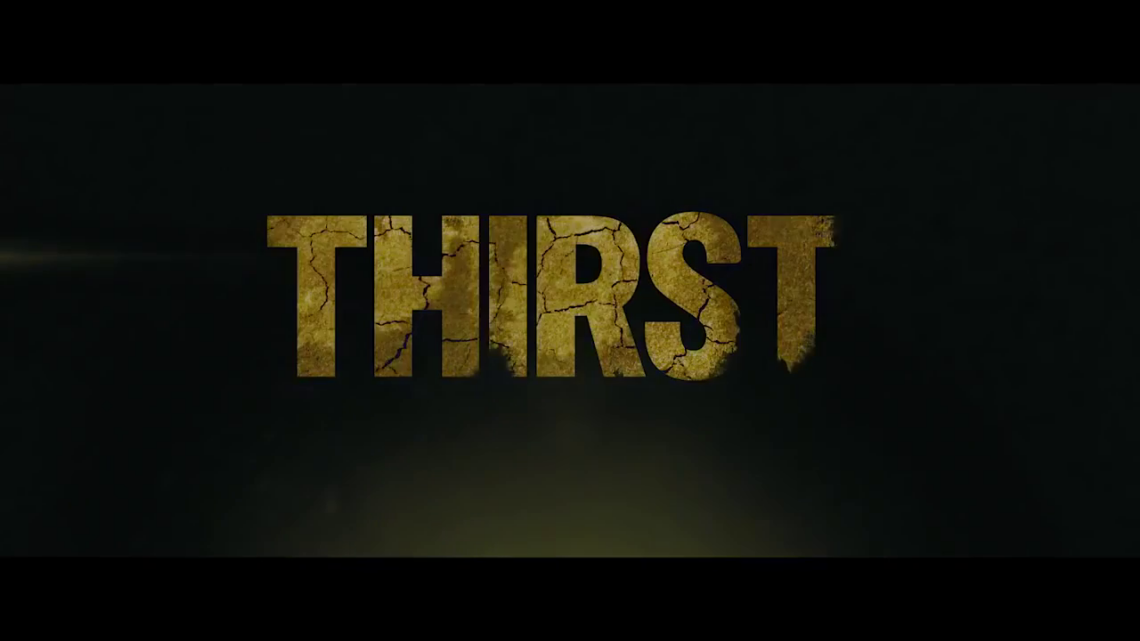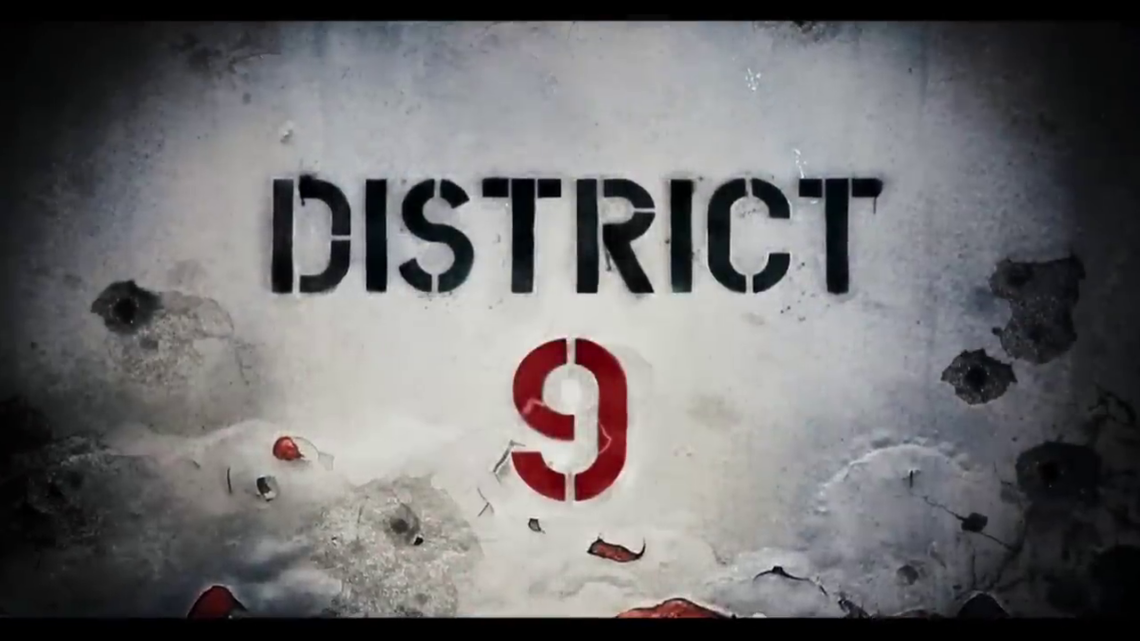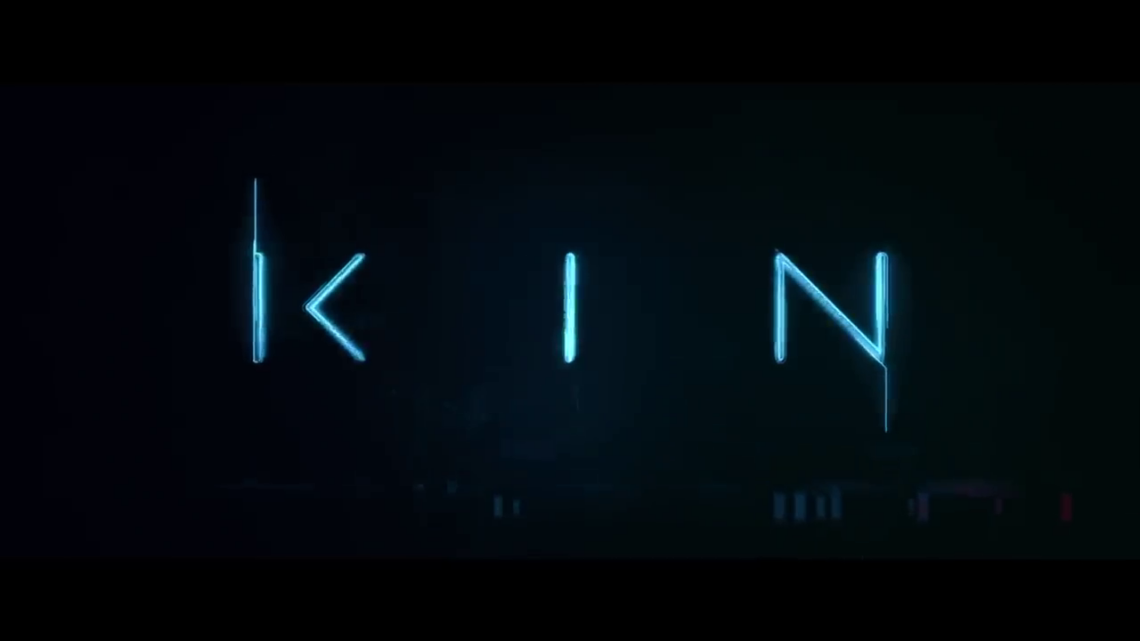-
#621 – Valerian and the City of a Thousand Planets (2017)
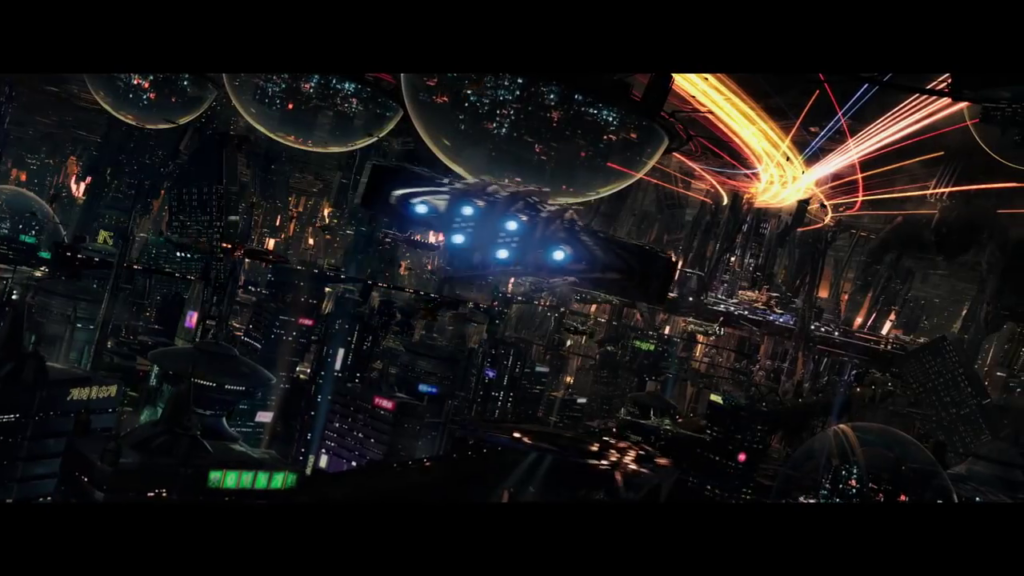
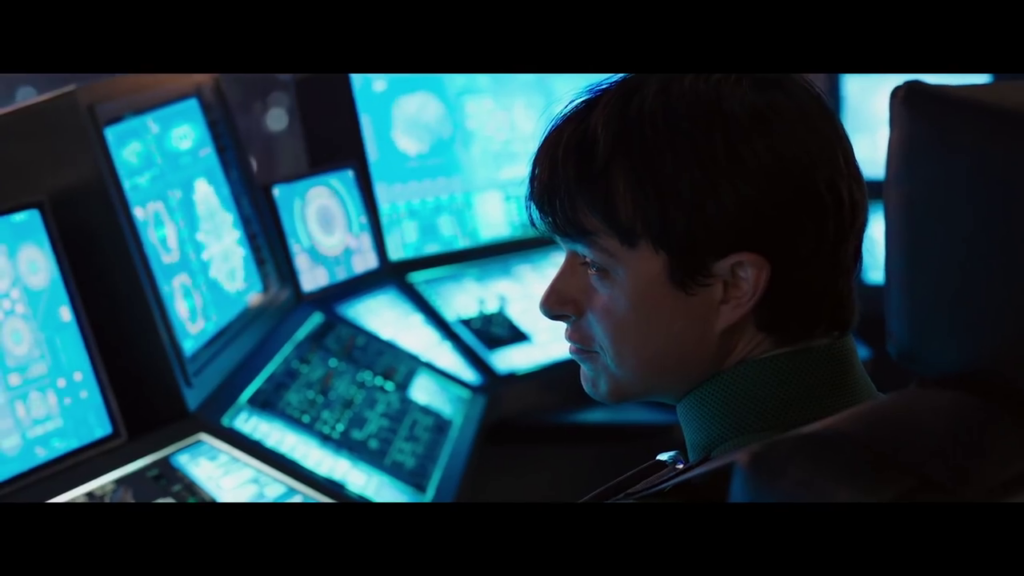
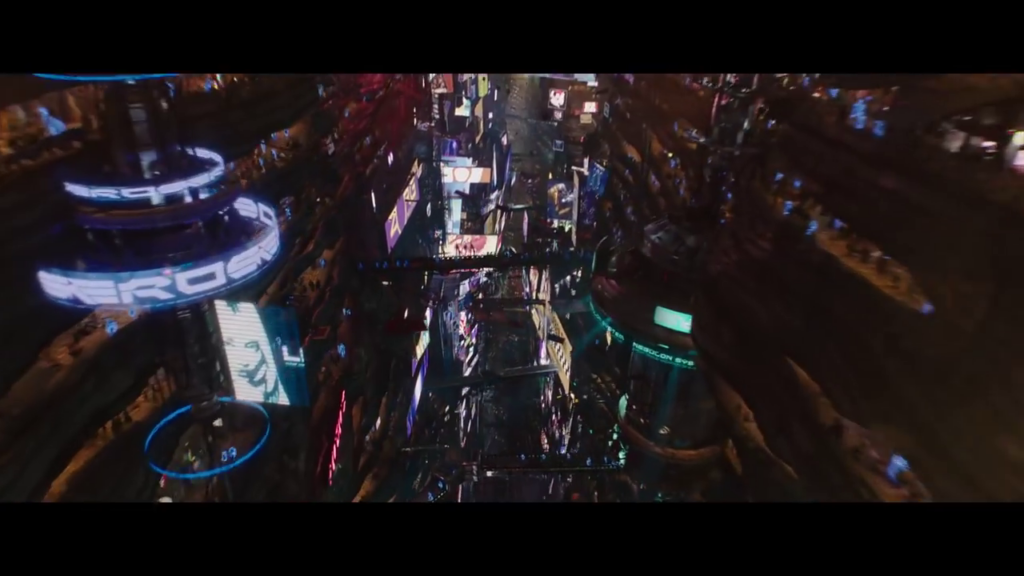
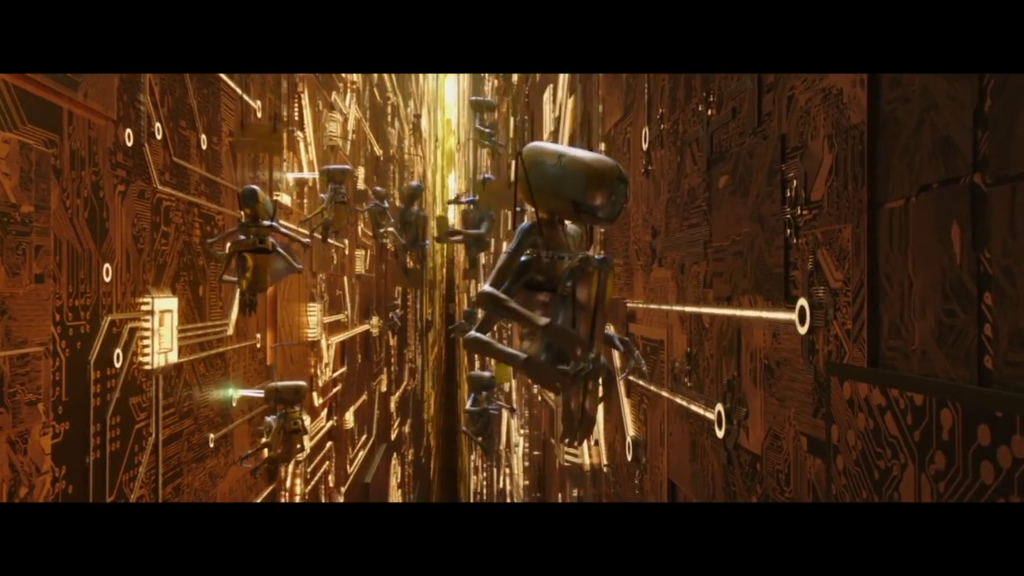
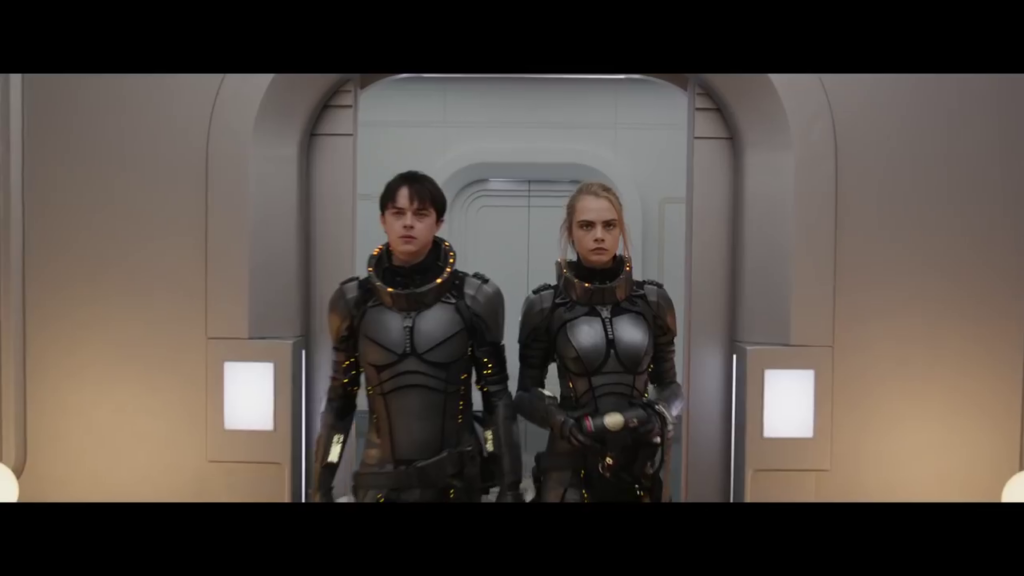
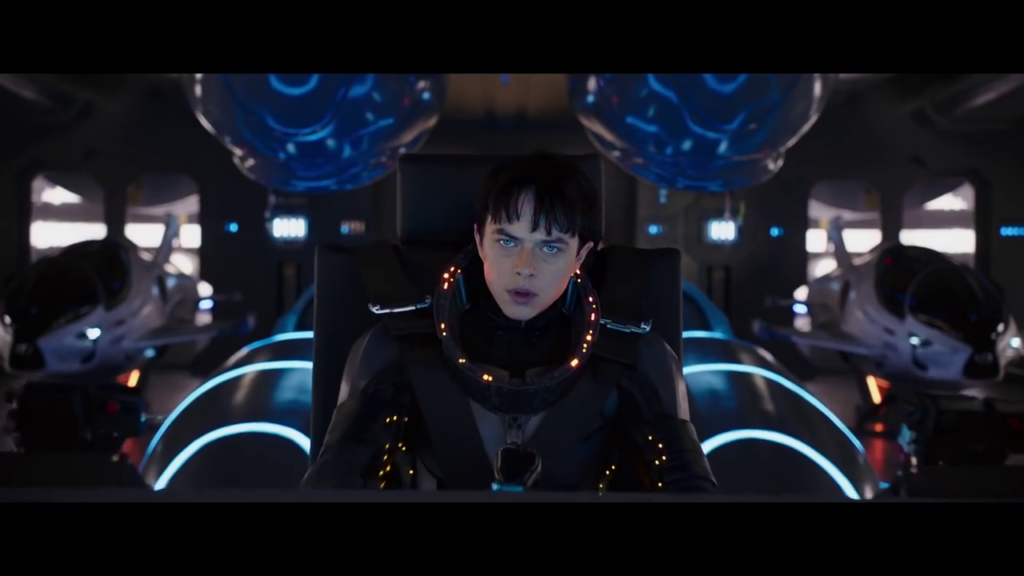
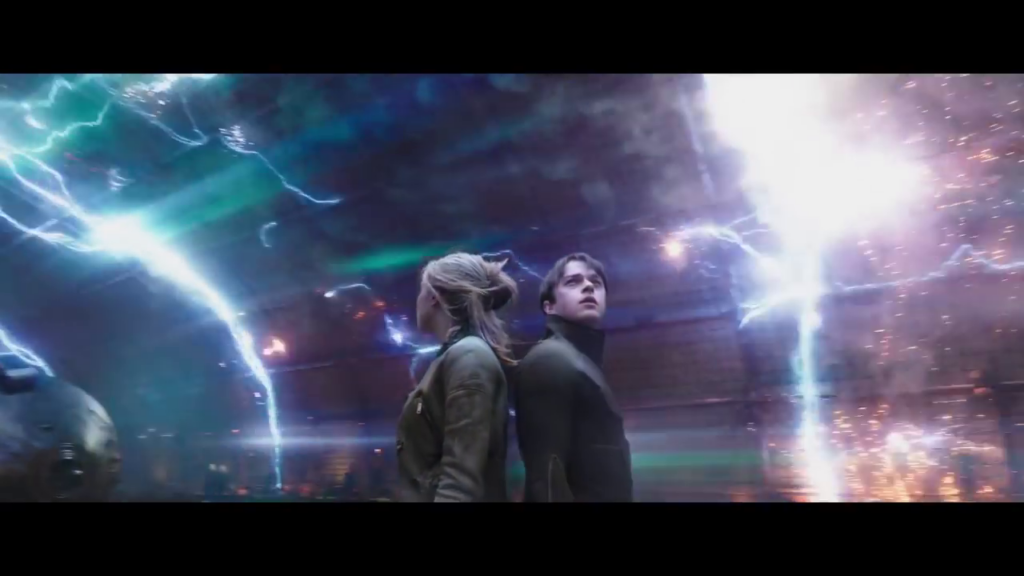
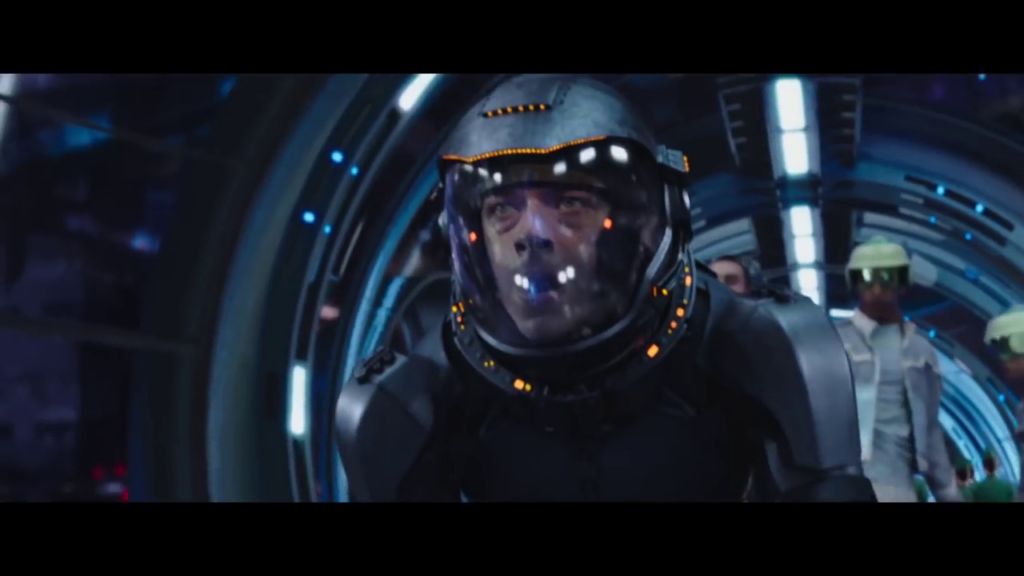
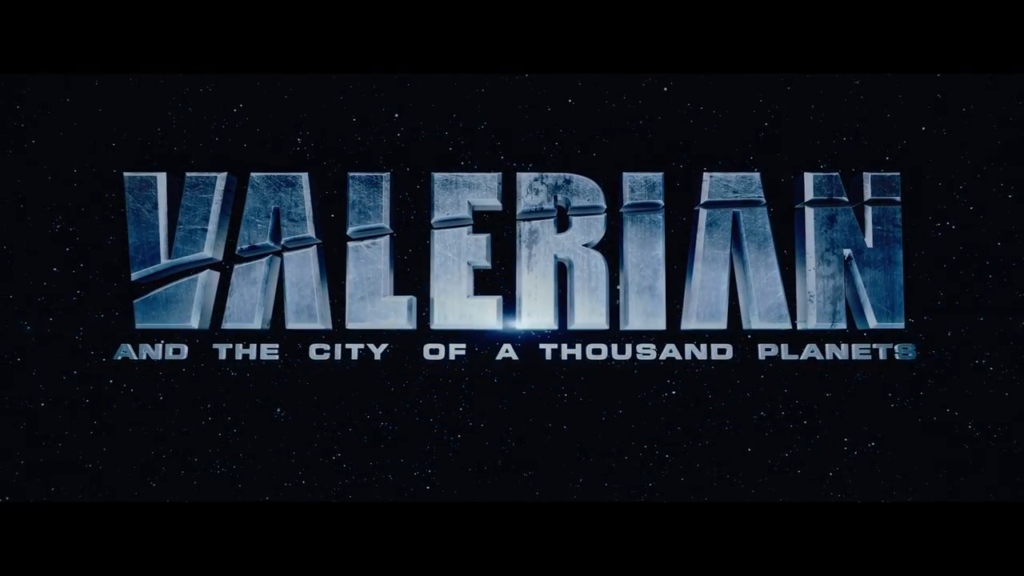
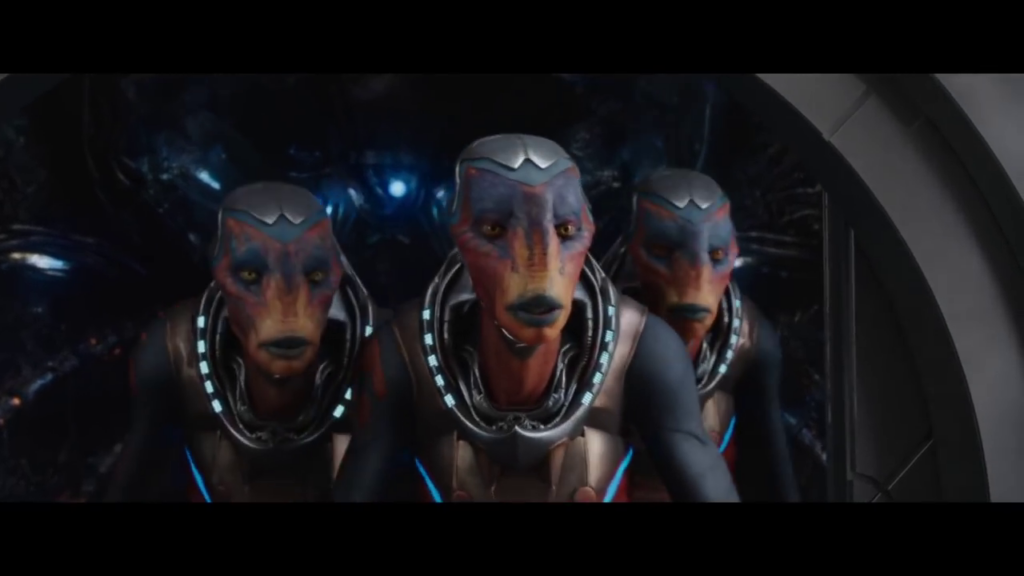
Valerian and the City of a Thousand Planets (2017)
Film review #621
Director: Luc Besson
SYNOPSIS: Alpha is a vast artificial city in space that houses over a thousand different species from across the galaxy. When a mysterious radiation threatens the city, military operatives Major Valerian and Sergeant Laureline are tasked with saving the city, and in doing so, uncover a dark secret that someone is trying to keep buried…
THOUGHTS/ANALYSIS: Valerian and the City of a Thousand Planets is a 2017 film based on the graphic novels of the same name. Humans built a city in space named Alpha, which gradually became home to many different species of aliens as well, and when it became too large, a plan was made to launch it from the Earth’s orbit into space. Some centuries later, the city is home to over a thousand species. Two members of the human military, Valerian and Laureline, are assigned a top secret mission to find out the cause of a radiation leak at the heart of the station that will overwhelm the station in a month unless they can stop it. Directed by Luc Besson (The Fifth Element), the film clearly owes its greenlighting thanks to the success of James Cameron’s Avatar in the sense of having CG non-humanoid aliens being a focus of the film. This is particularly prevalent in the opening scene, which focuses on a race of blue aliens clearly reminiscent of the Na’Vi. This really is a film of two halves: in the first half, we get introduced to the city of Alpha and all of it’s inhabitants, and we get a look at all the creative designs for the different species that reside in the city. We are also introduced to our main characters Valerian and Laureline, two soldiers in the human army, and a story that isn’t too original, but has enough urgency and energy to get things moving. The second half of the film in terms of story really starts to flag, as it resorts to more typical scenarios that don’t offer quite as much excitement. It’s still reasonably entertaining, but you can tell it is playing it safe by falling into using typical tropes. Even with the success of Avatar, perhaps the mainstream filmgoer wasn’t ready for something too alien.
One of the main threads of the film is the relationship between Valerian and Laureline, and the latter’s reluctance to accept the former’s advances. You know that she’ll eventually give in, and the film offers no surprises in that regard, but the journey getting there isn’t told as well as it could be: Laureline says Valerian needs to “grow up” and understand “what love is,” but it never feels like he makes that growth as a character, and she just…accepts him. Despite the strength of her character, she does fall into the role of getting kidnapped for a chunk of the film, and although it does try to not paint her as a damsel in distress, ultimately, that’s evidently what the film does. Dane DeHaan’s performance as Valerian delivers the cheeky rogue-ish elements of his character, but lacks the emotional depth and growth in his performance to underpin the main character’s relationships, as it doesn’t feel like he achieves the growth the film tries to portray he has. The rest of the supporting cast are fine, and don’t really stand out too much. Rihanna as “Bubbles,” a shapeshifting alien, is of note just because of how shoe-horned into the film it feels like it is. The film literally stops while she does a two minute-dance number, and she just shares the screen time until Laureline is rescued and she dies, being never mentioned again. It’s…a cameo that wasn’t necessary but someone obviously wanted in there.
In terms of effects and CG, it’s certainly impressive in terms of scale and creativity. Over two hundred species were designed and feature in the film in some way, and while we don’t get much depth into most of these aliens, we certainly get a more interesting variety than we do in Avatar. The action scenes are fast, colourful, and showcase more of the alien designs, but I can’t help but feel like this diversity could have been weaved more into the story somehow, as despite all of these alien species, the film focuses a lot on human affairs and leaves the aliens in the background. Overall, Valerian and the City of A Thousand Planets looks good, showcases a lot of creativity, and is fast-paced and entertaining, but equally is hampered by a fairly flat script full of unoriginal plot points, and a lead performance that doesn’t hit the notes it needs to. Fairly balanced between its positive and negatives, but entertaining enough to sit through despite its flaws.
-
#620 – Thirst (2015)
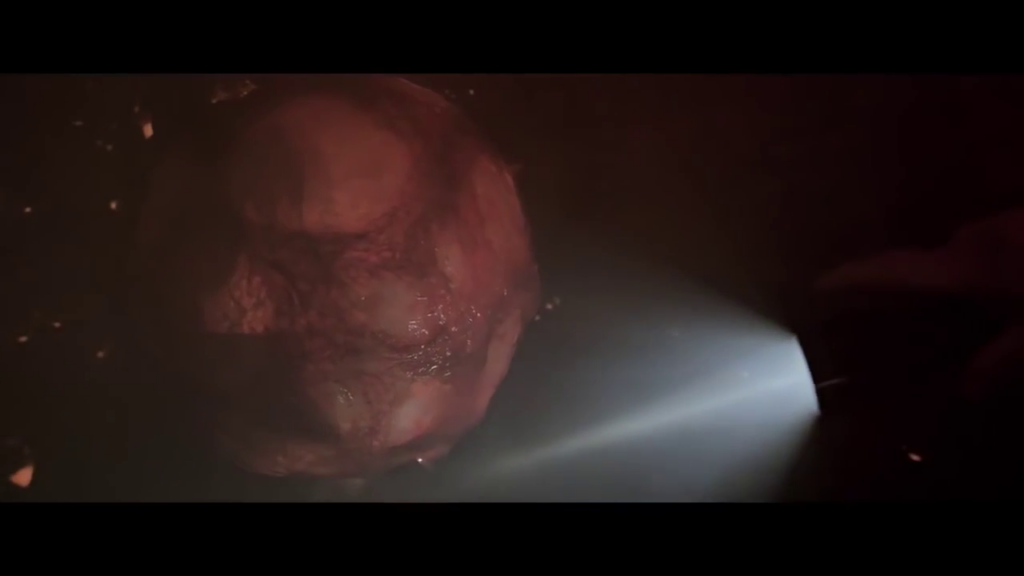
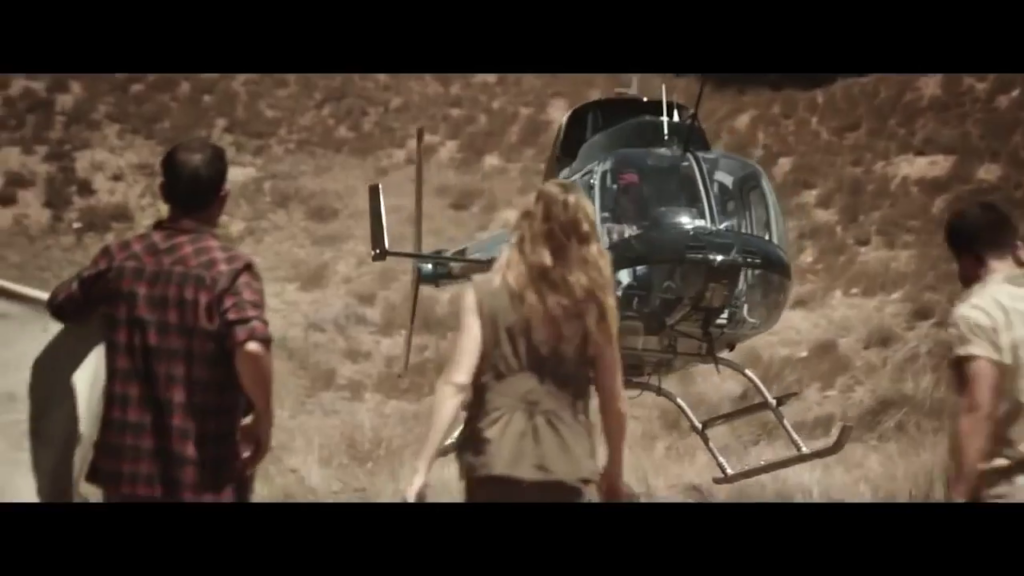
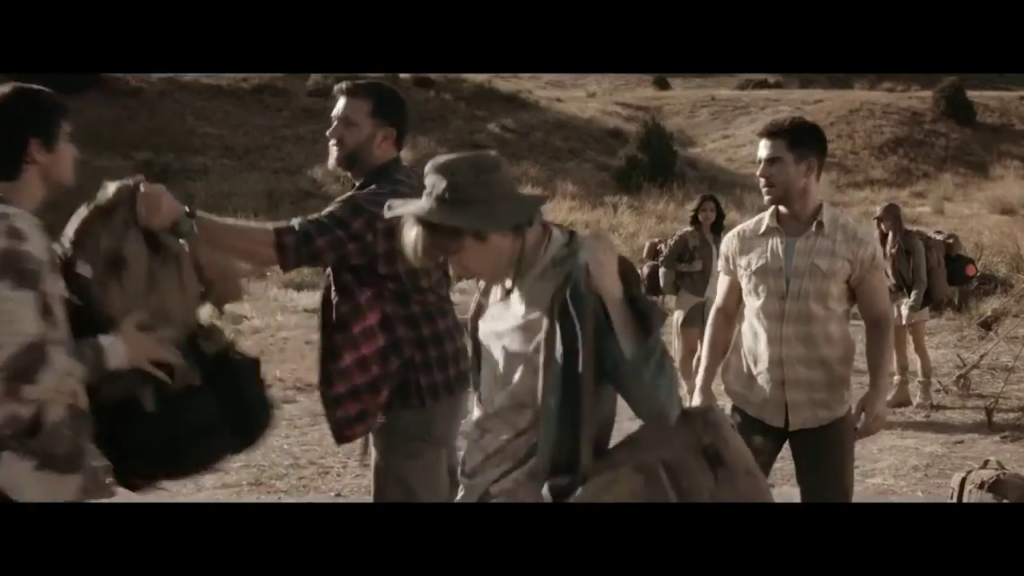
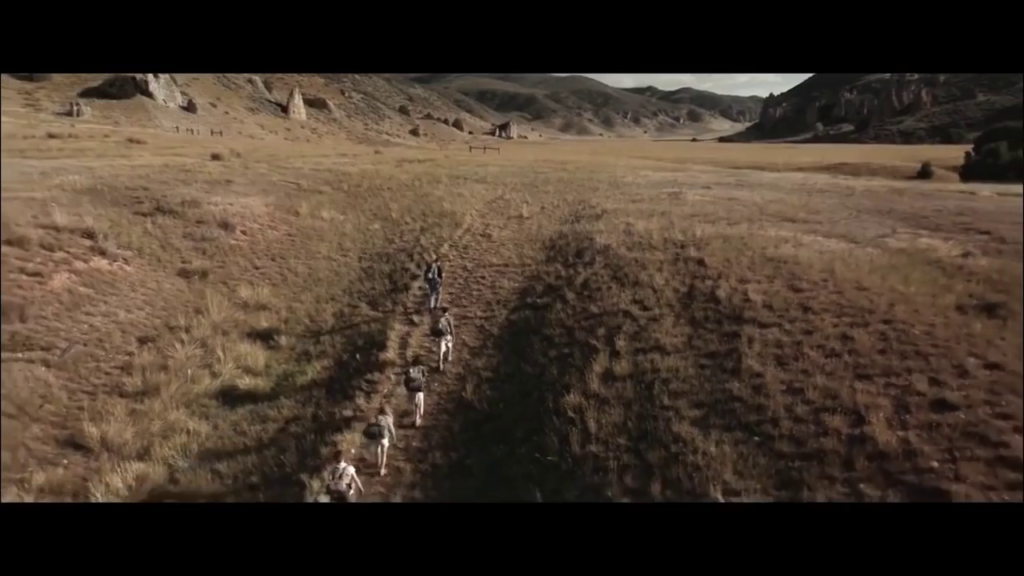
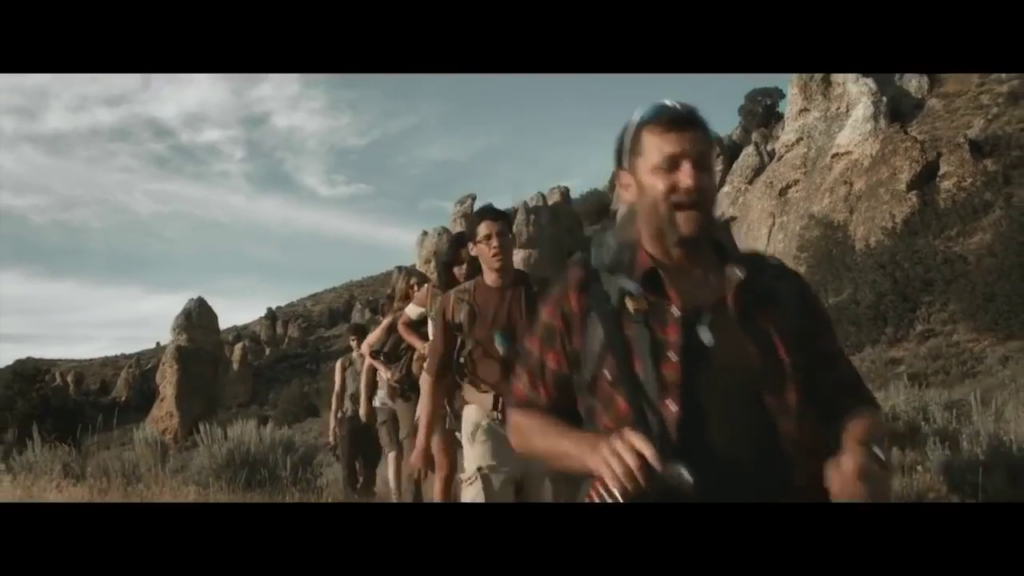
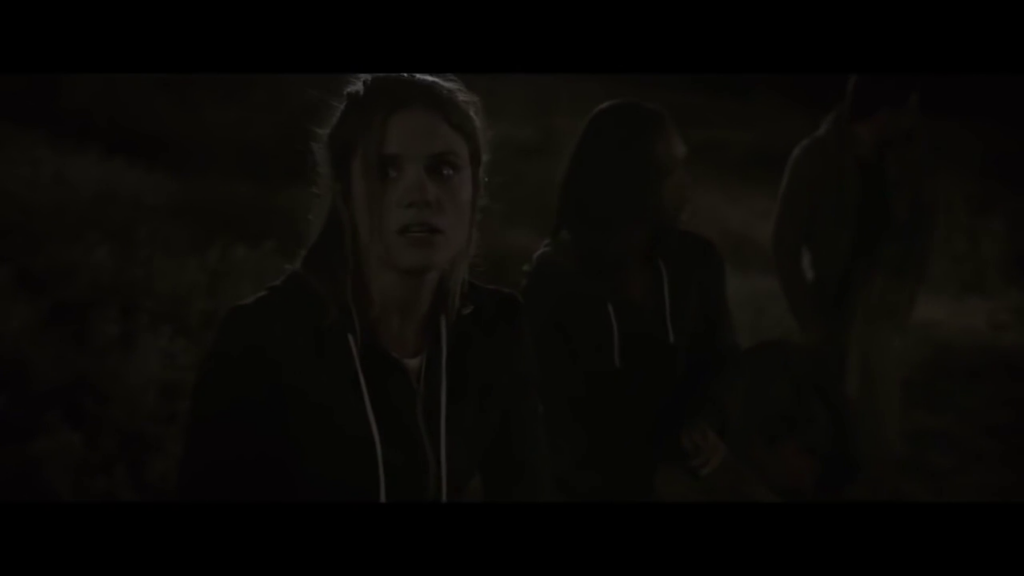
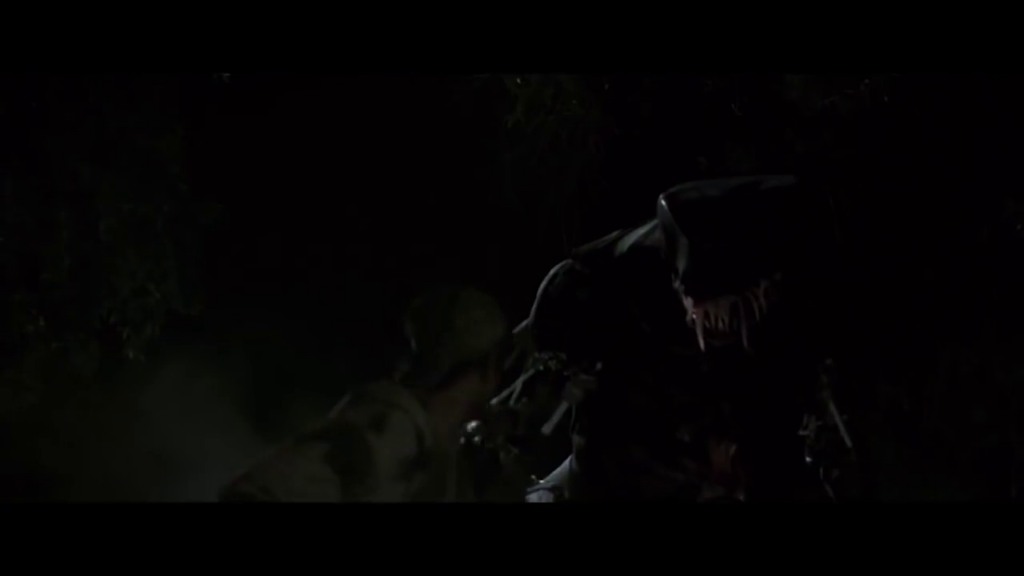
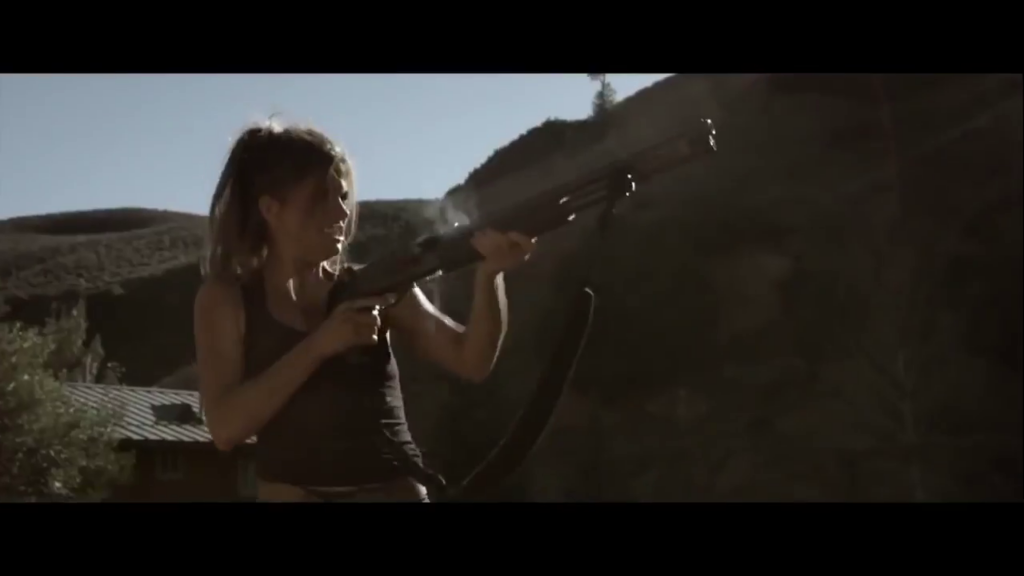
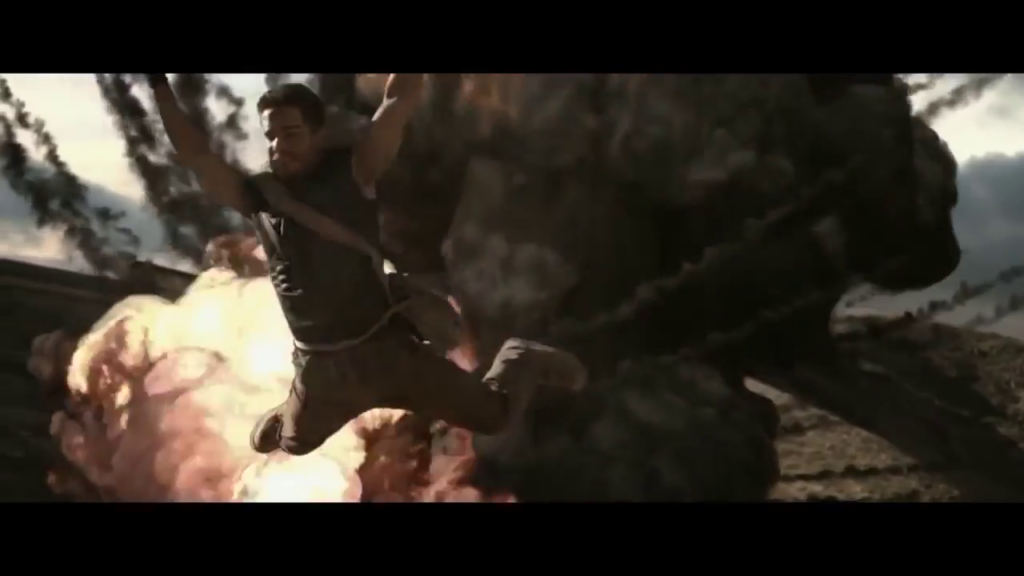
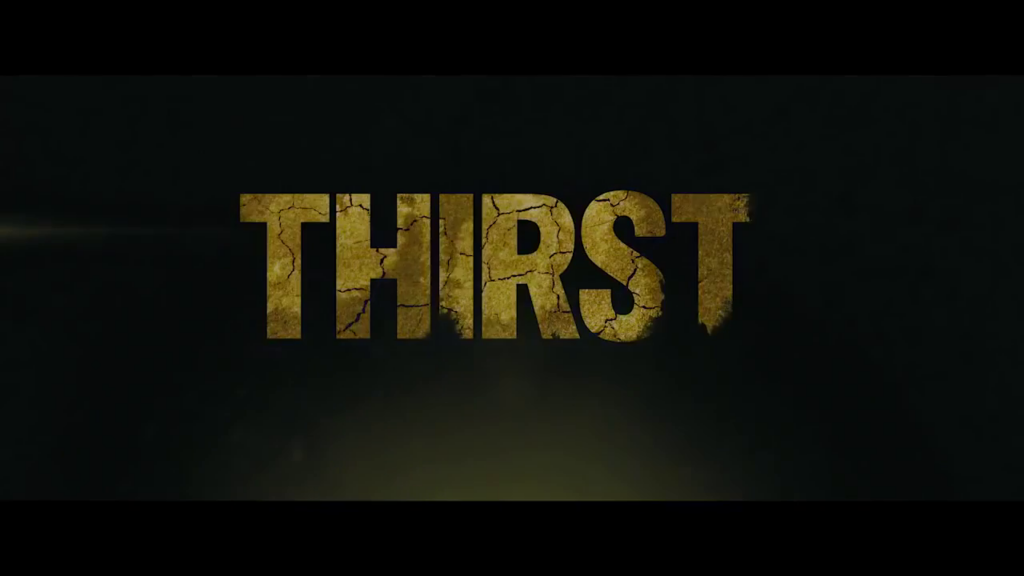
Thirst (2015)
Film review #620
Director: Greg Kiefer
SYNOPSIS: A group of young delinquents are sent into the wilderness to a couple who aim to toughen them up and make them responsible members of society by hiking through the wilderness. Unfortunately, lying in wait is an alien creature that aims to suck them dry, and with no means to contact the outside world, the group must try to survive before they are all hunted down…
THOUGHTS/ANALYSIS: Thirst is a 2015 sci-fi horror film. Opening up like every other horror film, we see an nameless character get murdered after discovering some sort of alien blob…thing. Cut to the film proper, a group of delinquent youths have been sent by their parents or whomever to the middle of the Californian wilderness (i.e. nowhere) to be subjected to a ten-day hike by a couple who run a business of toughening up such youths to make them productive members of society: that’s the story anyway, but it seems very dubious and highly illegal. Anyway, the group eventually stumbles upon an alien that wants to suck people dry (?), and they must find a way to survive and escape. It is, in short, every other creature/monster-based horror movie, with no real surprises or novelties to make it interesting. The plot points are predictable, and a lot of the film is just a lot of shouting and running around the middle of nowhere without being able to generate any real sense of atmosphere or terror. It’s not even hilariously bad, it’s just boring and nonsensical.
The characters are the usual bunch of horror unlikeable stereotypes: they don’t really develop as characters, and their deaths aren’t really impactful. One character in particular does virtually nothing and survives near to the end of the film, and I wonder if someone just forgot to do anything with them. Killing off the two “adult” characters could have been an interesting twist that forced the younger ones to grow up, but it doesn’t really happen. The alien is obviously a Xenomorph rip-off with no attempt to be original. For some reason, it’s also half-metal, which makes no sense. We’re given no sense of what this alien is or how it works, which isn’t too much of a deal insofar as we don’t need to know it’s motivations, but it would be nice to give the alien some substance to make it stand out.
Obviously made on a budget, the film just consists of the cast wandering about in the middle of nowhere as mentioned, and the special effects are unconvincing at best. No jump scares, no atmosphere, no tension, and no originality, Thirst won’t quench the need for a good horror.
-
#619 – District 9 (2009)
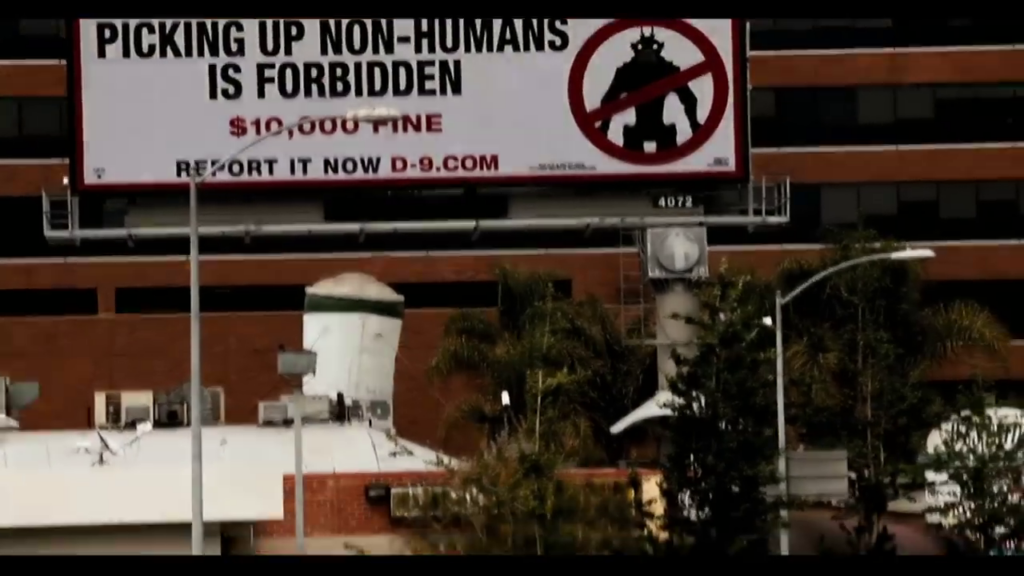
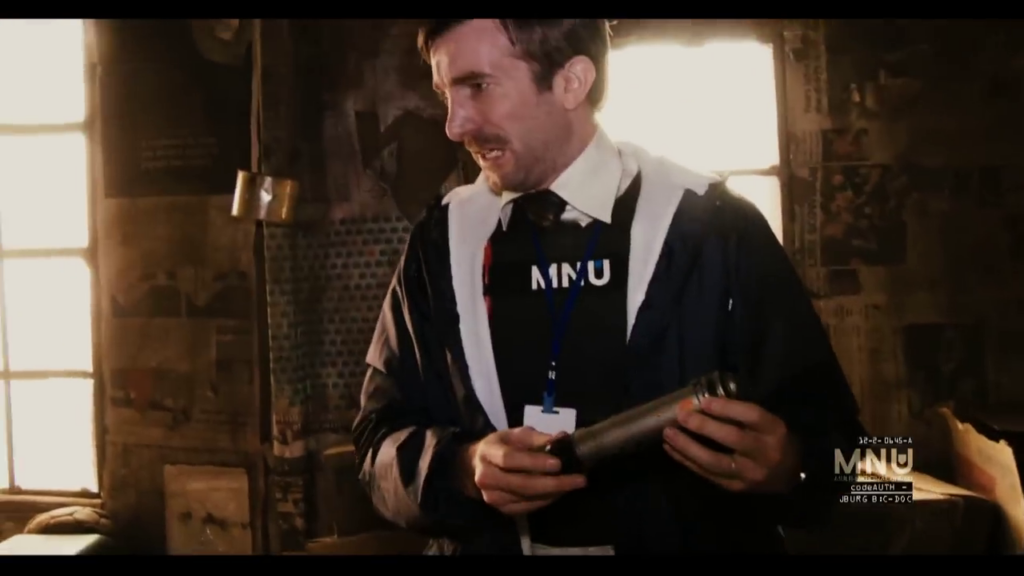
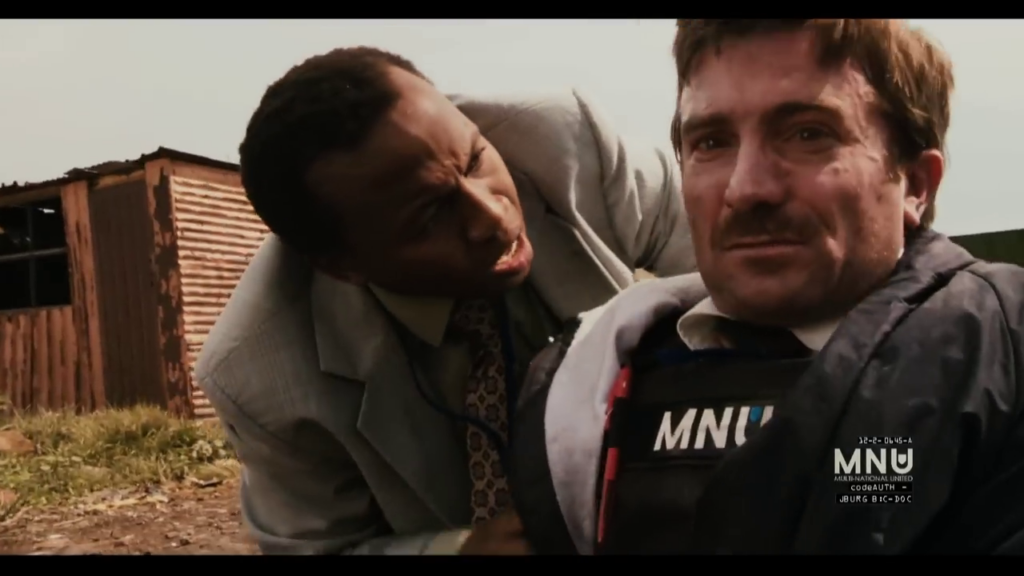
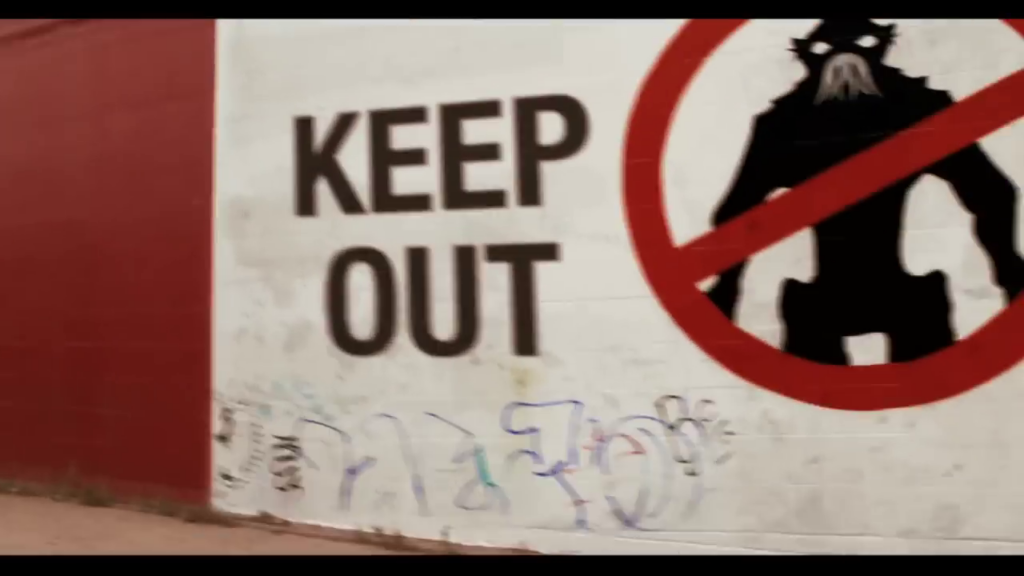
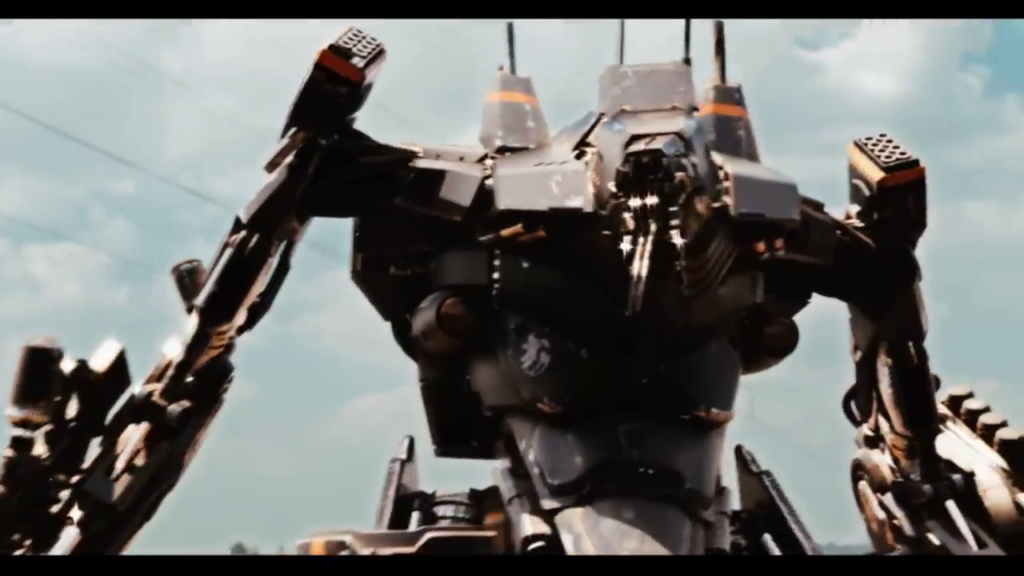
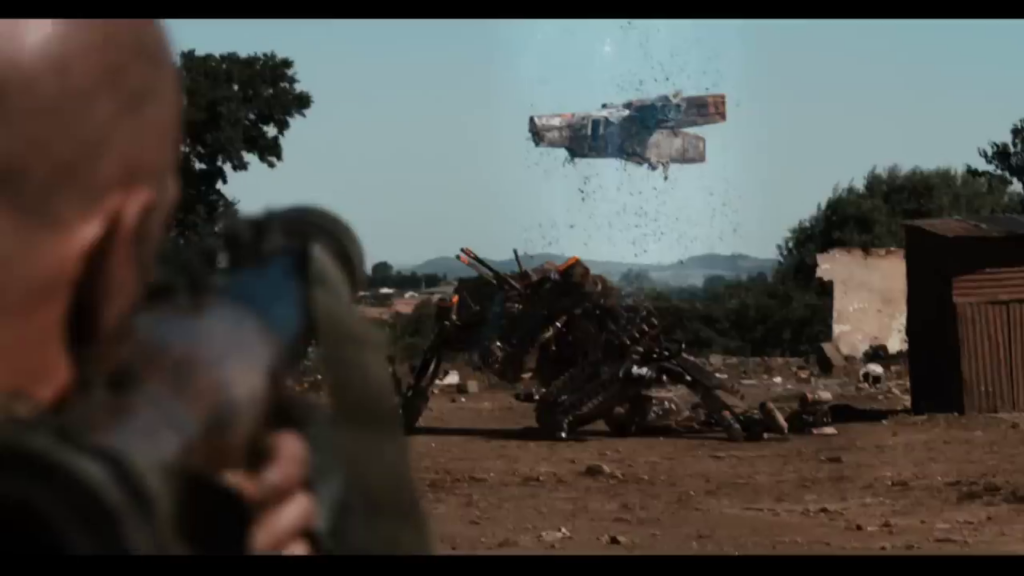
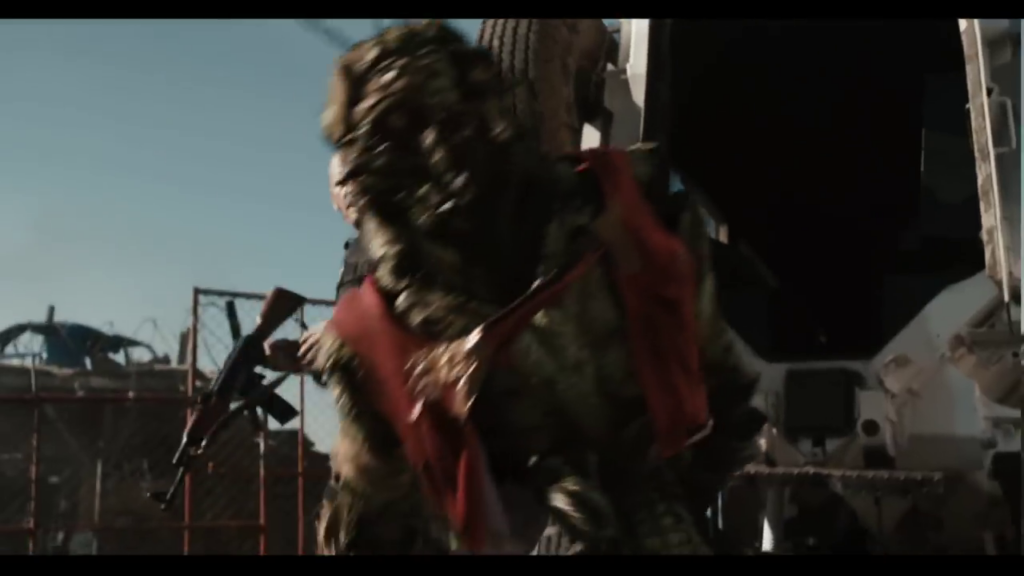
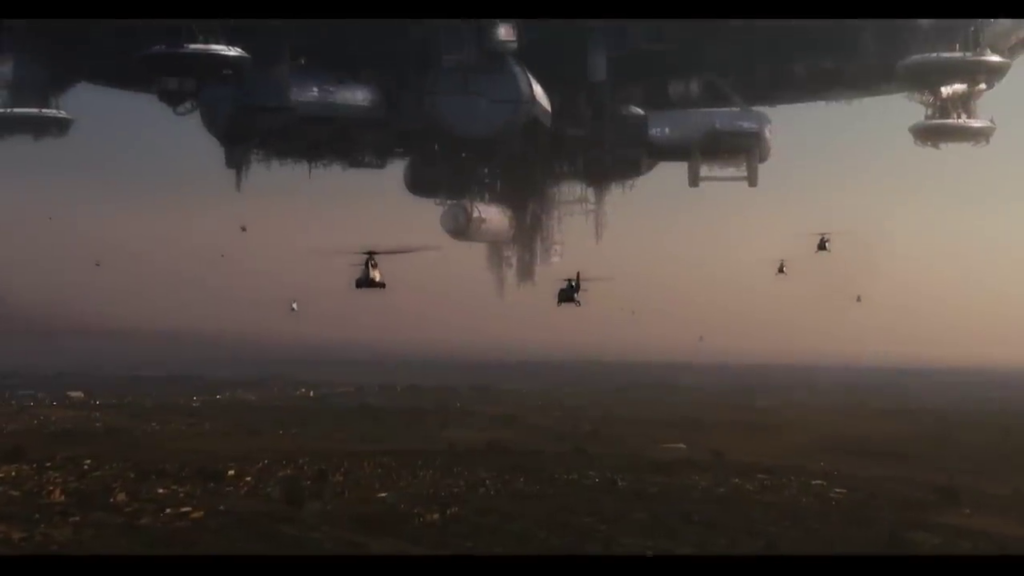
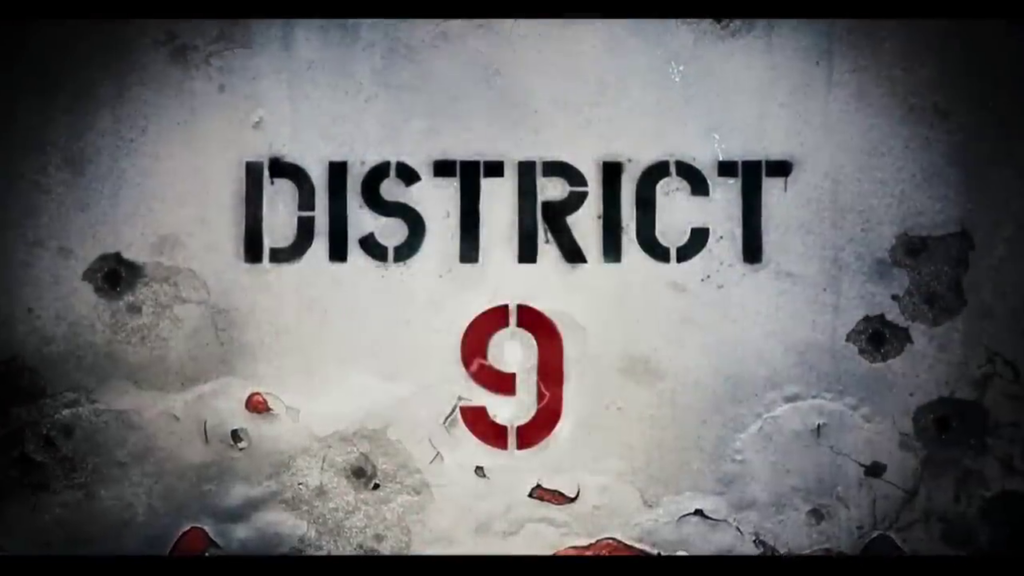
District 9 (2009)
Film review #619
Director: Neill Blomkamp
SYNOPSIS: 28 years after an alien ship arrived on Earth hovering over Johannesburg, the alien inhabitants are confined to a section of the city known as “District 9.” When the decision is made to “relocate them (forcibly) into a new camp outside of the city, Wikus van de Merwe is put in charge of leading the relocation, but when he is exposed to a strange substance, he finds himself slowly turning into one of the aliens, and is confined to be experimented upon. When he escapes, he seeks the only place where no one will look: district 9…
THOUGHTS/ANALYSIS: District 9 is a 2009 sci-fi film. 28 years after a spacecraft arrives to Earth, stopping to hover directly over Johannesburg. The alien inhabitants were cut free and settled in a sealed-off region of the city known as “District 9.” Now, after resentment has grown by humans for the “prawns” living in the city, seeing them as responsible for crime and costly, the government has decided to relocate them to a camp outside of the city, and hired weapons company Multinational united (MNU) to oversee the relocation. The head of the company chooses his son-in-law Wikus van de Merwe to oversee the operation, and they begin the task of delivering notices of eviction to the residents (and relocating them whether they agree or not). Wikus is exposed to a strange substance that slowly turns him into a prawn, which leads to him being contained and used for experiments (particularly in using the alien’s weaponry which only they can use). The film’s method of storytelling and giving the backdrop to the film through reports, interviews and documentary footage is a bit chaotic but it nevertheless gets the background of what is going on well, and makes it interesting without devolving into just plain exposition. Being set in Johannesburg brings us a setting different from the usual settings of films in New York or Los Angeles, and the location obviously brings up echoes of apartheid with the prawns being fenced off from humans. The film doesn’t really lean too much into that though: maybe it’s fine with just the setting being enough to offer an analogue between fiction and reality, but it does feel like it’s something that should be more of a focal point given the setting, but isn’t. There’s an element of satire that pervades over proceedings, which complicates things further, but the film is put together in such a way that you don’t need to understand all the different levels it is operating on.
The film is at it’s best when it offers a raw storytelling, told through all the different types of footage, offering flashes of lore and plot points from all angles that comes together quite nicely. The raw, messiness of the events of the film disrupts a more clean, sterile narrative, and keeps the stakes high. On a negative note, the film does have to fall into very cliché action scenes at points to move things along, which feel very out of place. The scene where Wilke escapes from the lab where he is held makes it seem a bit too easy, given that he was being held under maximum security, he manages to run up some stairs and out into the world with very little issue.
Wilke as a character starts off as a pencil-pusher promoted way beyond his ability, thanks to his Father-in-Law giving him the job (and maybe to take the blame for anything that inevitably goes wrong, the film leaves that open). Wilke seems to have a typical attitude to the alien “prawns,” in that he clearly has a negative view of them. His attitude towards them, interestingly, doesn’t really change much, even when he is turning into one himself, and he relies on them for help: he is always only thinking about himself. He doesn’t really get much of a redemption arc, but he is certainly a victim of humanity, but in a different way to the prawns themselves. It’s murky and not clear-cut but I suppose that’s what makes it stand out in the sci-fi genre. The prawns themselves are quite convincingly portrayed and brought to life, and though we’re not given too much backstory about them, we don’t really need it to understand their motives.
Overall, District 9 offers something original enough in the genre, weaving together complex elements and footage to disrupt a typical narrative and brings its messiness to the forefront of the experience, without alienating the viewer. It’s chaotic and messy, but clearly intentionally so. There are definitely parts where the film has to resort to more typical filming techniques and narrative points to bridge the gaps, but on the whole it offers enough to make it stand out in the genre, and entertaining enough regardless of how far you wish to dive into the satire and the sub-text of the story.
-
#618 – Kin (2018)
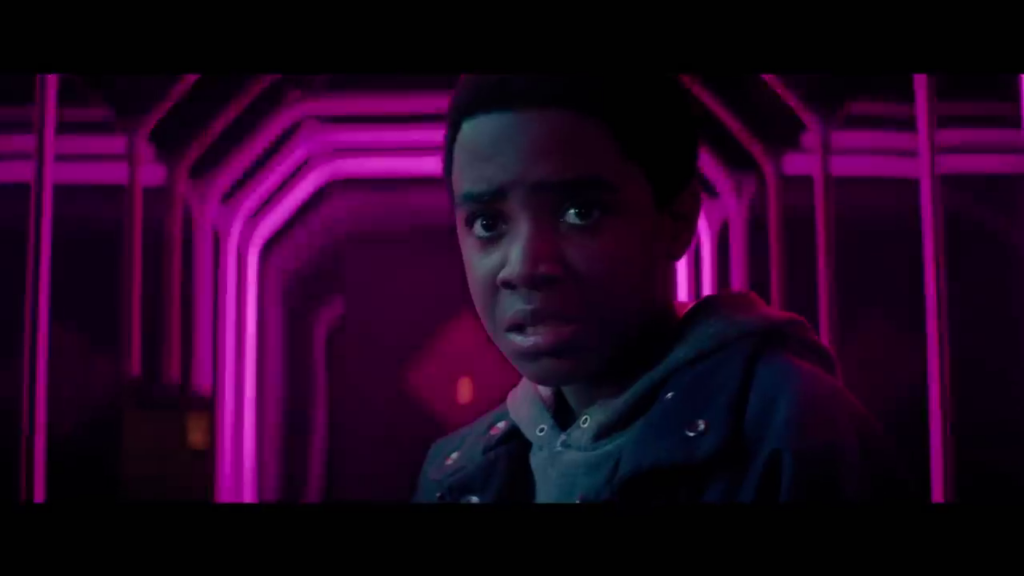
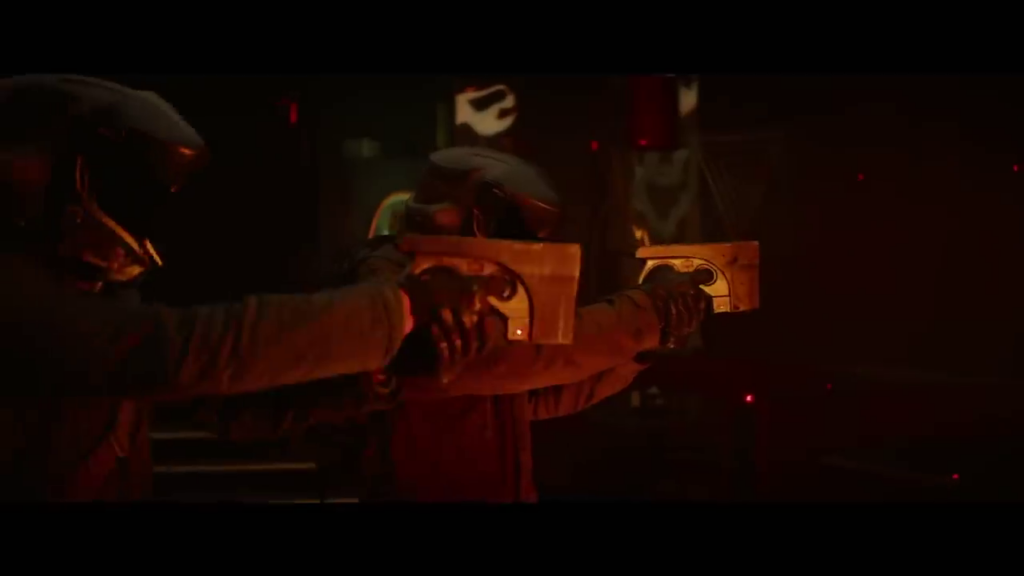
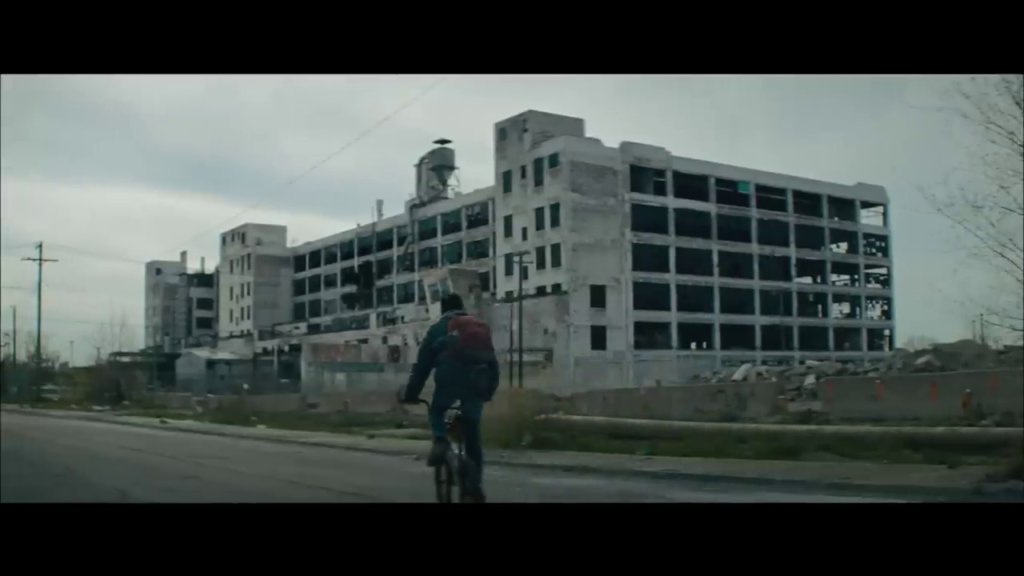
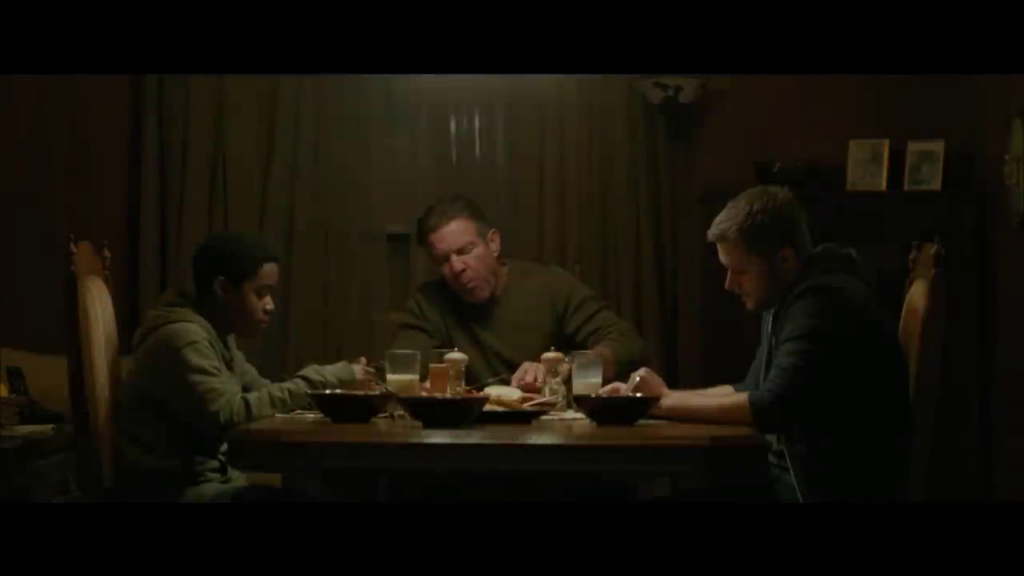
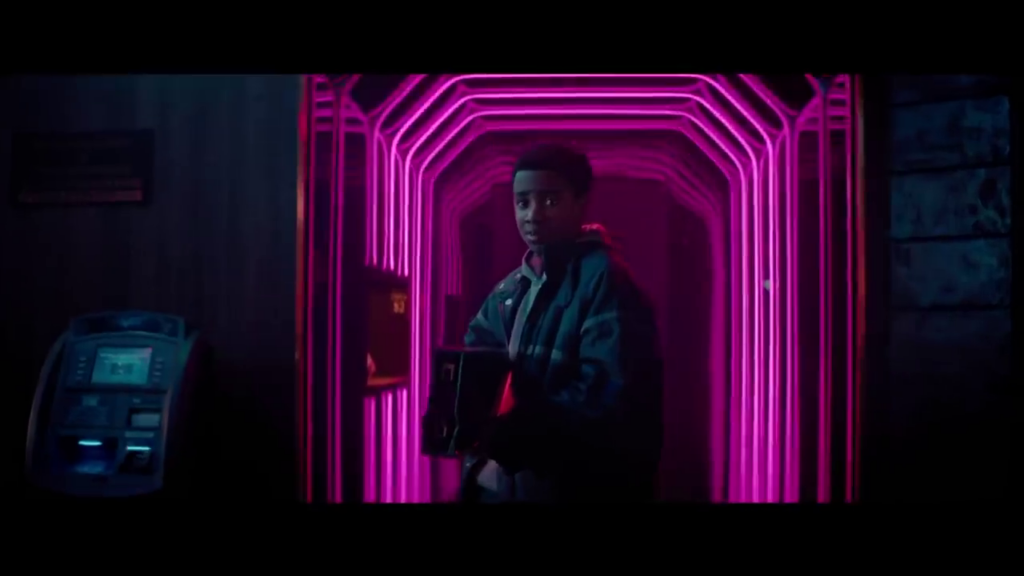
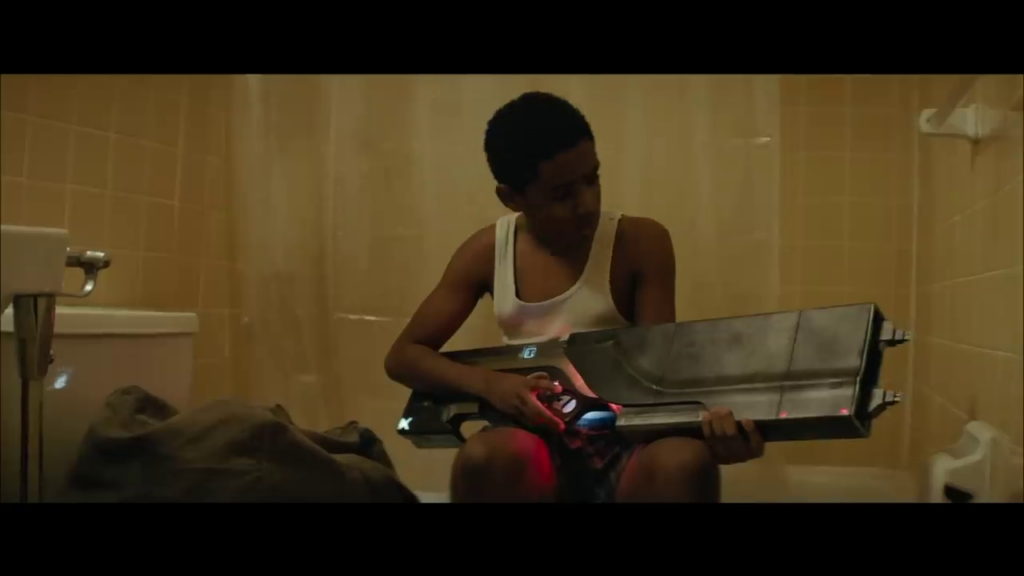


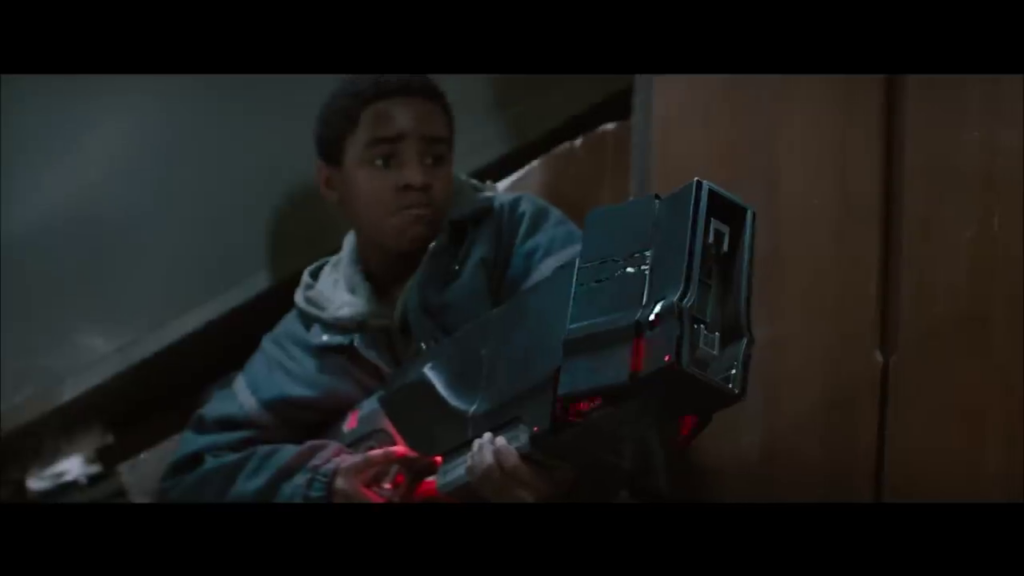
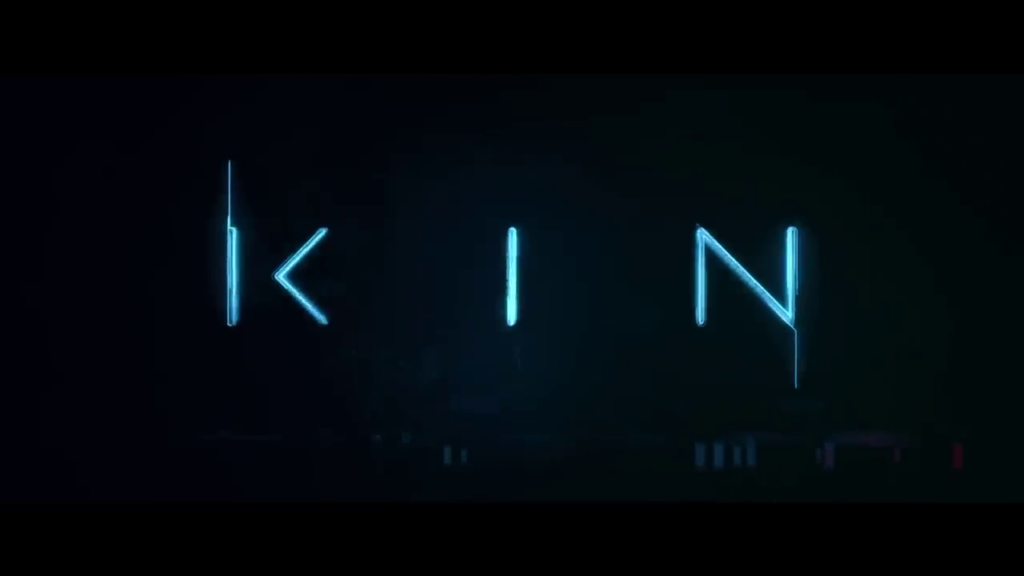
Kin (2018)
Film review #618
Director: Jonathan Baker, Josh Baker
SYNOPSIS: Eli Solinksi is a fourteen-year old boy who is scavenging copper wire to sell from abandoned buildings. One day, he comes across the aftermath of a battle of some sort, and a strange weapon, which activates when he touches it. At home, Eli’s adopted Father informs him that his son Jimmy is returning home after being in jail, and after some trouble, Jimmy decides to take Eli on a road trip, not telling him that their Father is dead and a criminal gang is hot on their tail…
THOUGHTS/ANALYSIS: Kin is a 2018 sci-fi film. The story centres around Eli, a fourteen-year old boy who lives with his adopted Father. He is scavenging abandoned buildings for copper wire when he comes across the aftermath of a battle, and a strange weapon that activates when he touches it. Meanwhile at home, his Father’s son Jimmy is released from prison, and, owing money to a local gang for protection, ends up robbing his Father’s safe. Catching them in the act, their Father is killed alongside the gang leader’s brother, and so Jimmy takes Eli on a road trip to escape from them, not telling Eli what has happened to their Dad. There’s a lot to take in there; the film is a sci-fi, family drama, road trip film all rolled into one. Perhaps expectedly, the film has troubles balancing all of these different elements. The core part of the story is this family drama and the bond between Jimmy and Eli, with it developing through this road trip. The problem with this is that the film seems to have picked the most mundane element to be the focus, and leans heavily on very typical tropes for that genre. For example, that Jimmy doesn’t tell Eli that their Father is dead, and keeps trying to tell him before being interrupted, leaving Eli to eventually find out through a TV report, is just so incredibly cliché it ruins any sense of personal character development. Another issue with this is that the film scuppers any relationship between the two main characters by having their bonding through montages, which don’t really give the characters space to interact beyond the generic stuff.
Another issue I had was that the characters don’t really deliver emotional performances. I don’t think this is fault on part of the actors; for some reason, none of the characters get really angry, or upset or anything, and what should be the most emotional scenes fall flat for this reason. Also, Eli kills a lot of people, and its never once addressed, or the consequences wrestled with. The film’s strong points are its action scenes, and the sci-fi element promises some mystery and a unique twist, but it’s mostly forgotten about until the end when someone turns up to just explain everything away. There’s some good things in here, but Kin tries to do too much, and puts its emphasis in the wrong places. This leads to the film ultimately falling back on well worn tropes that further erode the ability to develop it’s core characters and their relationship. Not terrible, but it’s flaws are plain to see.
